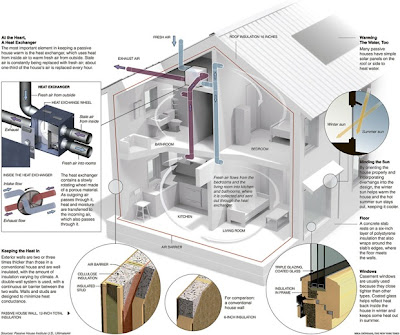
Passive home building is about installing features that regulate the building's interior temperature, without requiring active energy systems, such as heaters. Sealing the interior tight is key, features such as triple-thick walls, insulated, tightly-fitting double pane glass with reflective coating, and insulated floors. The orientation of the house itself helps as well, with windows that are shaded from the sun's natural arc during summer months, but more exposed to sunlight during winter months. The "heart," as The Times notes, is the heat exchanger, which sucks outside air into the house, and warms it using inside air. It's incredibly effective: Passive houses require no central heating. Though passive homes are estimated to cost perhaps 15% more to build than regular homes, their energy costs can easily be a whopping 85% lower.
All this sounds simple and irresistible, right? Yet there are only a few thousand passive homes in the world, and almost none of them are in the U.S. But the principles are quickly being disseminated in the building trades--Free Green offers free housing plans which utilize many passive principles.
full article
